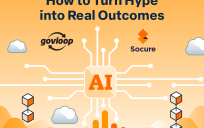The fear of artificial intelligence (AI) “taking our jobs” is unfounded. However, the use of AI is changing the way we work, requiring a different mindset and set of skills. A huge piece in the development of AI is “training the models” — feeding large amounts of data into an algorithm and then examining the results to ensure they are accurate. With these trained models in the market and working as part of daily business, it’s now time to shift focus to training the users.

Working with AI and AI-generated content requires a different set of skills that include critical thinking, algorithmic understanding, data analysis, deeper domain knowledge, cyber/data hygiene, and more. One report found that 92% of jobs require digital skills, with approximately one-third of workers lacking the skills needed to take on these jobs.
Government Focus on AI Training
The government is taking a leading role in filling the gap between available technology and users empowered to take full advantage of it.
- The AI Training Expansion Act of 2023 was introduced to require the Office of Management and Budget to expand a training program to provide federal managers with an introductory understanding of the operational benefits and privacy risks of using AI.
- The House Education and Workforce Committee recently passed the Bipartisan Workforce Pell Act, which would allow workers to access quality, short-term training programs.
- The Stronger Workforce for America bill modifies the Workforce Innovation and Opportunity Act (WIOA) to increase investment in digital skills training by providing grants and funding to local, state, and organizational employment programs and services for upskilling workers or providing them with expanded job opportunities. Currently, digital skills training programs are not “an allowable use.”
This funding and access to training are a great first step, but the training itself also has to modernize to be successful.
Artificial Intelligence Requires Real Hands-On Experience
AI training needs to be experiential and applicable to day-to-day work. Simply sitting through an hour-long PowerPoint presentation will not prepare employees to utilize AI effectively, efficiently or ethically.
First, employees need to see themselves as someone who works with data, creating the belief that, in fact, everyone is a data scientist. While true data scientists are highly educated and trained, the principles of data science are something needed in nearly every professional role. Ensuring that the workforce is not intimidated by data science requires training so that employees gain the skills and perspective needed to work in a data-rich environment.
On-the-job training is how today’s workforce will become AI-literate. These trainings must be interactive rather than one-sided lectures and utilize videos, written materials and opportunities for people to experiment with AI in a controlled environment. These situational trainings help employees figure out how to ask the right AI questions to get the information they need.
Making AI Work for Us
Rather than fearing AI taking over, we should instead focus on how important humans are to AI success. The results delivered by a generative AI solution are only as strong as the prompt used to generate them. Researchers have found that even very small changes to how prompts are written result in different outcomes, making it clear that the quality of prompts greatly affects the quality of outputs. With this power comes great responsibility to ensure that today’s workforce is trained to utilize AI and data in general to meet the technology’s promise of efficiency and productivity.
As the founder of GovEvents and GovWhitePapers, Kerry is on a mission to help businesses interact with, evolve, and serve the government. With 25+ years of experience in the information technology and government industries, Kerry drives the overall strategy and oversees operations for both companies. She has also served in executive marketing roles at a number of government IT providers.





Leave a Reply
You must be logged in to post a comment.